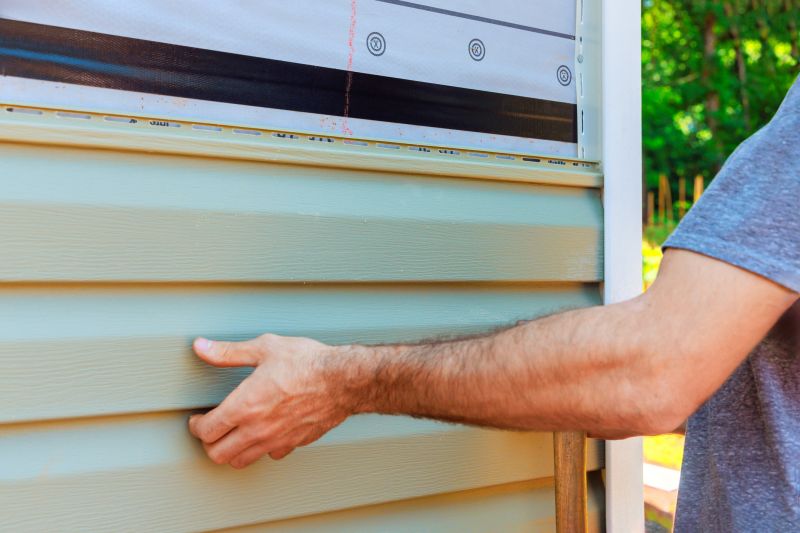Top-Rated Products For Siding Installations To Boost Your Efficiency
Equip yourself with the most effective products designed to speed up siding installation without compromising quality.
 Selecting the right products for siding installations is a critical step in ensuring a durable and aesthetically pleasing exterior for any building. The process involves understanding various materials, tools, and accessories that contribute to a successful siding project. From the initial preparation to the finishing touches, each component plays a vital role in achieving a professional result. Properly chosen products can help prevent issues such as water infiltration, pest intrusion, and structural damage, while also enhancing the overall appearance.
Selecting the right products for siding installations is a critical step in ensuring a durable and aesthetically pleasing exterior for any building. The process involves understanding various materials, tools, and accessories that contribute to a successful siding project. From the initial preparation to the finishing touches, each component plays a vital role in achieving a professional result. Properly chosen products can help prevent issues such as water infiltration, pest intrusion, and structural damage, while also enhancing the overall appearance.
Top Overall Option
Premium Siding Installation Kit
A comprehensive siding installation kit that includes essential tools, fasteners, and weather barriers designed to facilitate efficient and secure siding projects. This versatile kit supports various siding materials and is suitable for both DIY enthusiasts and professional contractors, offering a reliable foundation for quality installation.
Types of Products For Siding Installations
Vinyl Siding Panels
Flexible and easy to install, vinyl siding panels are popular for their low maintenance and wide range of styles.
Fiber Cement Boards
Durable and resistant to pests and weather, fiber cement boards provide a sturdy siding option with a variety of textures.
Wood Cladding
A traditional option offering natural beauty, wood cladding requires proper treatment and maintenance.
Metal Siding Panels
Lightweight and long-lasting, metal panels are often used for modern or industrial-style exteriors.
Composite Siding
Made from a blend of materials, composite siding combines durability with aesthetic versatility.
Weather Barriers and Wraps
These products protect the underlying structure from moisture and air infiltration during installation.
Siding Fasteners and Nails
Specialized fasteners ensure secure attachment of siding panels while preventing damage.
Corner Posts and Trim Pieces
Finish and accentuate siding edges with corner posts and trim designed for a clean look.
Sealants and Caulks
Sealants provide weatherproofing at joints and seams to enhance durability.
Siding Cutting Tools
Tools such as saws and shears designed for precise cuts to fit siding panels accurately.
Ladder and Scaffolding
Support equipment necessary for reaching high installation areas safely and efficiently.
Insulation Boards
Insulation panels installed behind siding to improve energy efficiency and comfort.
Popular Choices
Widely used for its affordability and ease of installation, vinyl siding remains a common choice.
Known for their strength and versatility, fiber cement boards are favored for long-lasting exteriors.
Popular for modern designs, metal panels offer durability and a sleek appearance.
A traditional material appreciated for its natural aesthetic and customizable options.
Essential for protecting structures during installation, these products help prevent moisture issues.
Specialized fasteners are crucial for secure attachment and minimizing damage to siding materials.
Finishing touches that enhance the appearance and integrity of siding installation.
Used at joints and seams to ensure weather resistance and a clean finish.
Tools designed for precise cuts, enabling better fit and finish of siding panels.
Support equipment that facilitates safe and efficient high-level installation work.
The diversity of siding materials available today offers numerous options tailored to different preferences and requirements. Vinyl siding, fiber cement, wood, metal, and composite panels are among the most common types, each with unique installation needs. Complementary products like weather barriers, fasteners, and trim pieces are essential for completing the installation effectively. Understanding the specific characteristics and installation techniques for each product type can help in making informed choices.
In addition to the core siding materials, specialized tools and accessories facilitate easier installation and better results. This includes items such as siding removal tools, cutting equipment, and sealants that ensure a weather-tight fit. Proper planning and selection of these products can reduce installation time and improve the longevity of the siding. It's also important to consider the compatibility of different products to ensure seamless integration and optimal performance.
Ultimately, investing in high-quality, suitable products for siding installation can lead to a more efficient process and a superior finished appearance. Whether undertaking a small repair or a full exterior renovation, understanding the range of available products and their applications can make the project smoother and more successful.
Key Buying Considerations
- Compatibility with existing or planned siding materials to ensure seamless installation.
- Material durability and resistance to weather elements relevant to your climate.
- Ease of installation, especially if undertaking a DIY project or hiring professionals.
- Maintenance requirements for different siding types and accessories.
- Aesthetic options including color, texture, and style to match your design goals.
- Cost and availability of replacement parts or panels for future repairs.
- Compatibility of accessories such as trim, fasteners, and weather barriers with the main siding material.
- Installation requirements, including tools needed and space considerations.
- Compliance with local building codes and standards for exterior cladding.
- Longevity and expected lifespan based on material properties and installation quality.
- Impact on energy efficiency, especially when considering insulation options.
- Environmental factors like susceptibility to pests, mold, or corrosion.
- Weight of siding panels and support structure requirements.
- Availability of warranties or guarantees from suppliers or manufacturers.
- Ease of handling and transportation of large panels or bundles.
This content contains affiliate links. We may earn a commission if you purchase through these links, at no additional cost to you.
